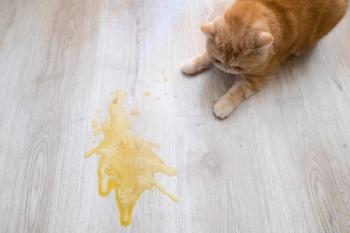
Molecular research on GI parasites in pets presented ACVIM
Two research abstracts offer new data on widespread prevalence in North America
First ACVIM research abstract
Antech Diagnostics announced in a press release1 it showcased its largest molecular parasite study2 at the 2023 American College of Veterinary Internal Medicine (ACVIM) Forum. The first of 2 research abstracts focused on over 300,000 fecal samples from cats and dogs collected in the first 10 months following KeyScreen GI Parasite PCR's 2022 debut. KeyScreen is a comprehensive molecular diagnostic test, which can identify 20 intestinal parasites in cats and dogs from a single 0.15 gram fecal sample.
The study found2 molecular diagnostic testing demonstrated over a quarter of dogs and cats from the studied population were infected with parasites (1 in 4), displaying much more sensitive detection than conventional fecal testing (1 in 10).What’s more, the research revealed that 1 in 4 dogs and cats (over 25%) were infected with at least one parasite, and co-infections were found in 1 in 5 pets with parasites (over 20%). With the dog samples that discovered hookworm, 1 in 10 (over 11%) were found to have the marker for anthelmintic drug (benzimidazole)-resistance.2
Further research also showed the parasites are more widespread geographically and across breeds in North America than previously believed.1
Another KeyScreen study into anthelmintic-resistant canine hookworms in North America had found the problem is much more widespread throughout the US3 with over 11% of detected canine hookworms were identified with the drug resistance marker 167Y.2 Also, the hookworm resistance epidemic is now emerging in Canada.
Treatment resistance hookworm markers have been detected in more than 72 dog breeds, proving it is no longer just a problem in greyhounds. Drug-resistant hookworms are a problem North American veterinarians must keep on their radar.4
Second ACVIM research abstract
An additional KeyScreen research study presented at ACVIM today, displayed how these drug-resistant parasites are rapidly adapting, through investigation of another recently discovered hookworm benzimidazole treatment resistance marker.4,5 The new marker (134H) increased the detection of hookworm benzimidazole treatment resistance by 25% in dog hookworm detected samples (143) obtained in Florida.
The existing drug resistance marker 167Y was found in 31 samples, and the marker 134H was found in another 8, thus increasing the rate of resistant strains by 25%. In response, this second marker is now included in KeyScreen to give veterinarians the most advanced data.
Christian M. Leutenegger, BSc, DrMedVet, PhD, FVH, vice president of research and development at Antech and KeyScreen inventor who presented both abstracts at ACVIM Forum 2023 said, in a release1: "Until recently, parasites have been adapting at a rate that has outpaced technology. KeyScreen is a significant advancement in veterinary diagnostics, providing a powerful tool to detect parasites in a way we have never been able to before. This innovation has important implications for GI parasite One Health and also, antimicrobial stewardship. DNA doesn't lie, it's either there or it's not – there is no subjectivity."
References
- Antech Diagnostics presents largest molecular study on GI parasites in pets at ACVIM, sharing new insights on prevalence in North America. News release. Antech Diagnostics. June 16, 2023. Accessed June 16, 2023. https://www.prnewswire.com/news-releases/antech-diagnostics-presents-largest-molecular-study-on-gi-parasites-in-pets-at-acvim-sharing-new-insights-on-prevalence-in-north-america-301853010.html
- Christian M Leutenegger, et al. Frequency of intestinal parasites in dogs and cats identified by molecular diagnostics. ACVIM abstract 2023.
- Leutenegger CM, Lozoya CE, Tereski J, Savard C, Ogeer J, Lallier R. Emergence of Ancylostoma caninum parasites with the benzimidazole resistance F167Y polymorphism in the US dog population. Int J Parasitol Drugs Drug Resist. 2023;21:131-140. doi: 10.1016/j.ijpddr.2023.01.001.
- Christian M Leutenegger, et al. Associated of the novel benzimidazole resistance marker Q134H with F167Y in dogs with Ancylostoma caninum. ACVIM abstract 2023.
- Venkatesan A, Jimenez Castro PD, Morosetti A, et al. Molecular evidence of widespread benzimidazole drug resistance in Ancylostoma caninum from domestic dogs throughout the USA and discovery of a novel β-tubulin benzimidazole resistance mutation. PLoS Pathog. 2023;19(3):e1011146. doi: 10.1371/journal.ppat.1011146.
Newsletter
From exam room tips to practice management insights, get trusted veterinary news delivered straight to your inbox—subscribe to dvm360.




